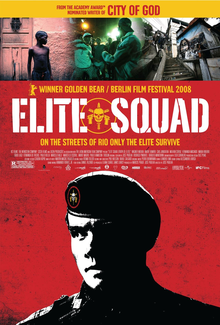
Favela is an umbrella name for several types of impoverished neighborhoods in Brazil. The term, which means slum or ghetto, was first used in the Slum of Providência in the center of Rio de Janeiro in the late 19th century, which was built by soldiers who had lived under the favela trees in Bahia and had nowhere to live following the Canudos War. Some of the last settlements were called bairros africanos. Over the years, many former enslaved Africans moved in. Even before the first favela came into being, poor citizens were pushed away from the city and forced to live in the far suburbs.

Rocinha is a favela in Brazil, located in Rio de Janeiro's South Zone between the districts of São Conrado and Gávea. Rocinha is built on a steep hillside overlooking Rio de Janeiro, and is located about one kilometre from a nearby beach. Most of the favela is on a very steep hill, with many trees surrounding it. Around 200,000 people live in Rocinha, making it the most populous in Rio de Janeiro.
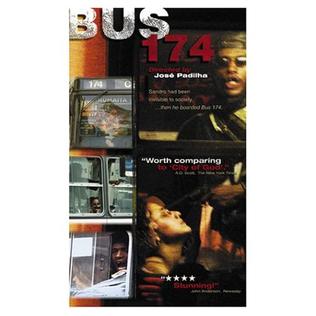
Bus 174 is a 2002 Brazilian documentary film. It is the directorial debut of director José Padilha and co-director Felipe Lacerda.
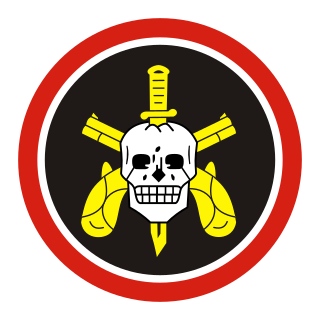
Batalhão de Operações Policiais Especiais (BOPE) is the tactical police unit and gendarmerie of the Military Police of Rio de Janeiro State (PMERJ) in Brazil. Due to the nature of crime in favelas, BOPE units utilize equipment deemed more powerful than traditional civilian law enforcement, and have extensive experience in urban warfare as well as progression in confined and restricted environments.

Tim Lopes was a Brazilian investigative journalist and producer for the Brazilian television network Rede Globo. In 2002, the media reported him missing while working undercover on a story in one of Rio's favelas. It was later learned that Lopes had been accosted by drug traffickers who controlled the area, was kidnapped, driven to the top of a neighboring favela in the trunk of a car, tied to a tree and subjected to a mock trial, tortured by having his hands, arms, and legs severed with a sword while still alive, and then had his body necklaced—a practice that traffickers have dubbed micro-ondas.
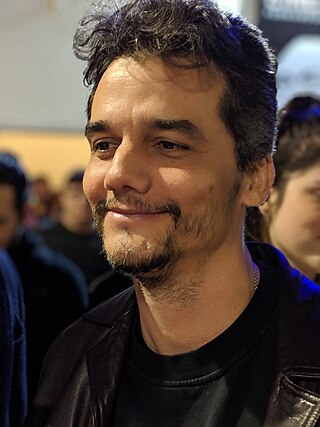
Wagner Maniçoba de Moura is a Brazilian actor, director and filmmaker. Wagner started his career doing theater in Salvador, where he worked with renowned directors, and soon scored some appearances in films. In 2003, he got his first leading roles in movies, in addition to having a prominent role in Carandiru, which propelled him to the main scene of Brazilian cinema. He continued starring in national feature films, including the box office hits Elite Squad and Elite Squad 2, playing the famous character Captain Nascimento. The first film received the Golden Bear award and both productions reverberated outside Brazil, which boosted the actor's international recognition.

Complexo do Alemão is a group of favelas in the North Zone of Rio de Janeiro, Brazil.

José Bastos Padilha Neto is a Brazilian film director, producer and screenwriter. He is best known for directing the Brazilian critical and financial successes Elite Squad and Elite Squad: The Enemy Within and the 2014 remake of RoboCop. He has won the Golden Bear at the Berlin International Film Festival for Elite Squad in 2008. He is also the producer of the Netflix original series Narcos, starring frequent collaborator Wagner Moura, and directed the first two episodes in the series.

Vidigal is a neighborhood and a favela in Rio de Janeiro, Brazil.

Elite da Tropa is a Brazilian book written by the ex-police officers André Batista and Rodrigo Pimentel together with Luiz Eduardo Soares. It was first published in 2006. The book originated the film Elite Squad.

The Morro da Babilônia is a hill in the Leme neighbourhood of Rio de Janeiro, separating Copacabana beach from Botafogo. It is home to a favela known by the same name, as well as the favela Chapéu Mangueira. Morro da Babilônia is an environmentally protected area.
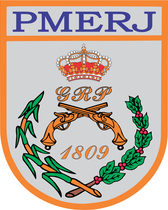
The Military Police of Rio de Janeiro State (PMERJ) like other military polices in Brazil is a reserve and ancillary force of the Brazilian Army, and part of the System of Public Security and Brazilian Social Protection. Its members are called "state military" personnel.
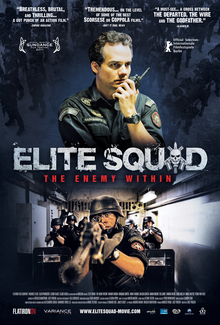
Elite Squad: The Enemy Within is a 2010 Brazilian action thriller film directed and co-produced by José Padilha, who co-wrote it with Bráulio Mantovani and Rodrigo Pimentel. The sequel to 2007's Elite Squad, it furthers the plot of a semi-fictional account of BOPE, the special operations force of the Rio de Janeiro Military Police, with a focus on the relationship between law enforcement and politics. The film was released in Brazil on October 8, 2010.
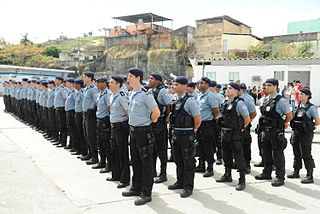
The Pacifying Police Unit, abbreviated UPP, is a law enforcement and social services program pioneered in the state of Rio de Janeiro, Brazil, which aims to reclaim territories, most commonly favelas, controlled by gangs of drug dealers. The program was created and implemented by State Public Security Secretary José Mariano Beltrame, with the backing of Rio Governor Sérgio Cabral. The stated goal of Rio's government is to install 40 UPPs by 2014. By May 2013, 231 favelas had come under the UPP umbrella. The UPP program scored initial success expelling gangs, and won broad praise. But the expensive initiative expanded too far, too fast into dozens of favelas as state finances cratered, causing a devastating backslide that enabled gangs to recover some of their lost grip.

Totalmente Inocentes is a 2012 Brazilian comedy film directed and written by Rodrigo Bittencourt. The film is a parody of the "favela movies", a genre whose exponents films are City of God and Elite Squad.
On July 14, 2013, Amarildo de Souza, a 43-year-old bricklayer from the Rocinha favela in Rio de Janeiro, Brazil, was called in for questioning by Unidade de Polícia Pacificadora (UPP) officers on his way home from the market. Believed to be connected to drug trafficking activity in the favela despite having no prior involvement in illegal activity, de Souza was brought in for questioning during Operation Armed Peace, during which roughly 300 officers from Rocinha's UPP force flooded the favela in order to arrest drug traffickers. It was during this two-day long raid that de Souza was brought to the police station and never seen again.
Tavares Bastos is a favela in the Catete neighborhood of Rio de Janeiro, Brazil. It is named after the Brazilian politician Aureliano Cândido Tavares Bastos. The main access road is the Rua Tavares Bastos.

The Vila Cruzeiro shootout took place on 24 May 2022 in the favela of the same name in Rio de Janeiro, during a joint operation by the Special Police Operations Battalion (BOPE), the Federal Police and the Federal Highway Police that resulted in at least 26 people killed by gunshots or cutting objects. It was the second most lethal police operation in the city of Rio de Janeiro, second only to the Chacina do Jacarezinho, which occurred a year earlier.

The armed conflict for control of the favelas in Greater Rio de Janeiro or simply Civil conflict for control of the favelas is an ongoing conflict between Brazilian militias, organized criminal groups Comando Vermelho, Amigos dos Amigos, Terceiro Comando Puro and the Brazilian state.
